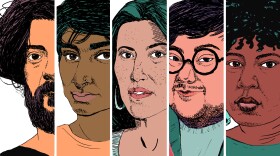
Karen Grigsby Bates
Karen Grigsby Bates is the Senior Correspondent for Code Switch, a podcast that reports on race and ethnicity. A veteran NPR reporter, Bates covered race for the network for several years before becoming a founding member of the Code Switch team. She is especially interested in stories about the hidden history of race in America—and in the intersection of race and culture. She oversees much of Code Switch's coverage of books by and about people of color, as well as issues of race in the publishing industry. Bates is the co-author of a best-selling etiquette book (Basic Black: Home Training for Modern Times) and two mystery novels; she is also a contributor to several anthologies of essays. She lives in Los Angeles and reports from NPR West.
-
What's old is new. From ingredients to techniques, chefs are playing with that most traditional of comfort foods: lasagna. We dig in to what's between the layers from nonna to nouveau.
-
Diahann Carroll died Friday at 84. Carroll was a Broadway, night club, and Hollywood singer and actress when NBC asked her to star in the sitcom Julia, as the first non-stereotyped Black character.
-
Morrison was the author of Beloved, Song of Solomon and The Bluest Eye. She was awarded the Nobel Prize in Literature, the Pulitzer Prize for Fiction and the Presidential Medal of Freedom.
-
100 years ago this week, some of the bloodiest race riots this country has ever experienced erupted in more than two dozen cities, including Chicago. It was known as the Red Summer.
-
For more than a century the Chicago Defender has chronicled Black life in America. After Wednesday it will cease its print editions.
-
Nosrat is that rare thing: a woman of color in the upper echelons of the hypercompetitive food world. She is acutely aware of her unicorn status — and taking steps to try to change that.
-
Looks like this year, April showers brought April flowers. As in, a bouquet of outstanding poets. So stop and smell the roses, my friends.
-
For millions of African-Americans who did not otherwise see themselves in the mainstream media, Ebony was more than a magazine. It was a public trust. This week marks its final chapter.
-
The Chicago publishing giant that launched Ebony and Jet magazines, and made them a touchstone in African-American life, is closing its doors. It plans a court- supervised sale of its assets.
-
Black students at San Francisco State College walked out in a protest that led to the rise of ethnic studies departments at colleges and universities around the country.






